- Home
- Anthony Trollope
Phineas Finn, the Irish Member Page 2
Phineas Finn, the Irish Member Read online
Page 2
Though they sometimes get tangled in an undergrowth of subplots and portrait chapters Trollope's novels are not normally complex in their organization. The main story-line of Phineas Finn is typically simple and loose-strung. A young Irishman comes to England to make his fortune. He starts steadily enough in law but chance gives him an opening in the faster world of politics. He takes his chance and hazards all on a parliamentary career. In it he is assisted by intelligence, energy and sexual charm, hindered by poverty, Catholicism and honesty. He has a great success, a great fall and at the end a partial recovery. His various trials are an education and in his final resignation from political office Phineas exhibits the moral heroism Trollope felt was becoming scarce in public life. In his private, and more especially in his love life, the hero vacillates most unheroically, but he definitely belongs with Trollope's amiable young men whose instincts are good, even if their moral will is not always up to preventing a little unintended caddishness.
To anyone who knows Trollope's other fiction this will sound familiar. Weakish young men making good in the end are numerous in the novels. But one feature does not fall into place: it was odd of Trollope to choose an Irishman. Apart from their being a negligible presence at Westminster, Fenianism in 1866 had made the Irish detested in England (Punch at this time habitually represents them as a rabble of pig-faced anthropoids). Moreover the Pope's encyclical of 1865 which declared liberalism irreligious had made Catholic politicians especially suspect. One could understand Trollope having an Irish Catholic hero if these current problems were to figure importantly in the novel, but though mentioned they are no more than mentioned. There was also the fact that an Irishman in fiction inescapably aroused the stereotype of his race as cultivated by a whole subgenre of literature and centuries of folk-lore. The comic writer Hood summarizes its features in a Theophrastan sketch from which I abstract the main heads:
AN IRISHMAN: Is a Man with two Ideas – no better than one: to wit, a right one and a wrong one, between which, like two Stools, his Wit comes constantly to the ground. Thus it is as natural for him to blunder as to breathe… Hence is he a Catholic by nationality… In his Politics he is commonly a Partisan: his main aversion being a Trimmer, or, as he describeth him, a Man who sits on both sides of the House at once… He hath a Scheme for reducing Tithes… Next to a Donnybrook, his Delight is a Duel or a Pistol-Duet… In Love his Flame is like unto a kitchen Fire, which requireth a wide Range; for he is a Sexagenarian, or in love with some sixty of the Sex at once… Sometimes he will hunt a Fortune, by way of Chance, but he is apt to outrun it as well as his own… For why I as he saith, – ‘It is better to hang than be dependent.’
There is a ready made Irish hero for the novelist, impulsive, hotheaded, engaging and slightly ridiculous. Nor does Trollope contradict the stereotype. Phineas is recognizably ‘Irish’ in Hood's definition: he blunders, he hates trimming, he hunts a fortune in his suit to Violet Effingham, he fights a duel over her with Lord Chiltern, if not a sexagenarian he is in love with some four of the sex at once and he gives up his political ambition because he will not give up his independence – ‘But I have views of my own,’ his first words in the novel, are borne out by his last deeds. Although Phineas is domesticated with the essential mid-Victorian virtues (he does not, for example, booze or roister) Trollope was clearly conscious of the family resemblance between his hero and the traditional Irish adventurer. He had, of course, in his time written proper Irish novels, indeed began and was to finish his novelist's career writing them. But this crossing of genres was provocative. An Irishman at Westminster was not as deliberate an oddity as A Yankee at the Court of King Arthur, but nevertheless somewhat along the same lines.
Trollope's explanation of the ‘blunder’ (as he came to see it) of making his hero Irish is singularly direct: ‘I created the scheme of the book during a visit to Ireland.’ Direct but unhelpful, and one is led to speculate further. One can, for example, point to the recurrent drama in Trollope's novels of the outsider struggling to enter the English establishment, a drama which may have had its source in Trollope's own social insecurity. More relevantly, perhaps, one knows that Trollope was sympathetically concerned with the grievances of Irish society. He had personally witnessed ‘the Great Hunger’. In the mid sixties he wrote eloquently against the iniquitous laws regarding land tenure and church tithes: it is quite possible that the original ‘scheme’ of Phineas Finn intended more protest and apology (with regard to current Fenian outrages) than Trollope in the event had mind or stomach for. The Irish land question does, of course, figure in the last chapters of the novel though in so shadowy a way as to be almost unnoticed. But the most plausible explanation for the Irish hero lies in the mood of Phineas Finn. It is an inaugural novel about and by a man starting on a political life. Fittingly it celebrates youth, energy, idealism and ambition. The Irishman's notorious liveliness apart, it was natural for Trollope to associate Ireland with these qualities for it was there at 26 (Phineas's age) that he fell into his ‘better life’. It was in Ireland that the previously dissolute young post-office clerk found his twin vocations of novelist and civil-servant.
Phineas Finn is an anachronistically ‘young’ novel and in this it probably reflects Trollope's mood rather than his fifty-one years. Three times the motto of Disraeli's ‘Young England’ trilogy is evoked as an apparently significant allusion:
Why then the world's mine oyster
Which I with sword will open.
And throughout there is in Phineas a leaven of the conquering energy of Disraeli's golden youths, the feeling that, as the lesser political novelist put it, ‘great consequences can only be brought about by the energy and devotion of our youth’. Of course Trollope was too level-headed to subscribe completely to Disraeli's romantic nonsense and one would not present Phineas Finn as his Vivian Grey. But Phineas is, as Madam Max calls him, ‘full of life’, and Trollope's heroes do not normally exuberate with youthful vitality. Returning to his favourite pastime Trollope more than once pictures Phineas as a high spirited horse, ‘a plunging colt’, and none the worse for it. ‘There are but few horses you cannot put into harness,’ he says, ‘and those of the highest spirits will generally do your work the best.’ Whether Phineas will in fact take the whip and harness himself to the Liberal party or follow his Irish waywardness and break loose creates half the novel's suspense (the other, slacker, half concerns the future Mrs Finn).
One last aspect of Phineas's Irishness may be mentioned here. In the novels of Lever, most famous of the Irish novelists, the hero is characteristically a devil-may-care soldier of fortune whose career is determined by the falling out of chance and miraculous strokes of luck. When Thackeray wrote his Irish novel he called it, deferring to the tradition, The Luck of Barry Lyndon. The Luck of Phineas Finn would be a usefully explanatory title. For Phineas's career is largely conceived as a gambler's lucky streak. When he first ventures at Loughshane ‘he could not but tell himself that the chances were twenty to one against him’. Later the odds shorten but he is still, in both senses, the outsider: ‘at every turn the chances would, of course be very much against him; ten to one against him, perhaps on every point; but it was his lot in life to have to face such odds’. His decisive acts are seen as a gambler's throw: as he determines to propose to Laura at Loughlinter he resolves ‘that he must at any rate play out his game, whether he were to lose it or to win it’. He loses. Lady Laura Standish has more sense than to marry an Irish ‘nothingness’ – even if she loves him. But irrepressibly Phineas bounces back into the game. ‘Whatever colour comes up, you'll hold trumps, I know’, says Miss Fitzgibbon, ‘some hands always hold trumps.’ And Madame Max's last cryptic words to the young man after his political suicide sum up a feeling Trollope's insistent use of this motif suggests throughout – ‘I think you will win.’
The fact that his hero has fortune chained to his chariot allows Trollope the freedom of the possible in his story. Such improbabilities as inheriting a necessary
£3,000 from a forgotten relative (‘a wonderful piece of luck’), his being on hand to rescue Kennedy from the garrotters (‘that child of fortune Phineas Finn’), the gift of three pocket boroughs (‘I never heard of such a run of luck’) and all the accidents which take him to the top in five short years would seem far-fetched had Phineas not the luck of the Irish. And by accompanying his hero as he ascends the rungs of society (the vertical image of the ladder is constantly evoked) Trollope can give us a measurement of the hierarchic distances which separate the Fitzgibbons from the Bonteens, the Bonteens from the Greshams, the Greshams from the Omniums. What we get in Phineas Finn is a lift attendant's view of English political society. It is an excellent expository device, but more than this it works towards a fine climactic reversal. Phineas's departure from political life is far from being the result of Fortune's at last frowning on him. He deliberately throws in his hand, to continue the metaphor, and with it all the winnings which have made him at 29 a man of political substance. Le jeu ne va plus: this sober and responsible mood of the novel after chapter 66 is an effective one with which to lower the curtain on Phineas's first act.
III
Trollope was over-pessimistic in supposing that no reader would follow his Palliser series through consecutively. But those who read Phineas Finn in its proper order might well wonder why Palliser, not Finn? Is not Phineas Finn a huge digression, an overblown sub-plot to the Palliser story? To understand that it is not, one must first appreciate that Phineas and Palliser are significantly alternate in character: secondly that in his novels Trollope often conducts an examination of the respective values of alternate philosophies or personalities without, apparently, always knowing what his conclusion will be. As so often with this author one must beware the easy sneer at his confession that ‘when I sit down to write a novel I do not at all know and I do not very much care how it will end’. In the parliamentary novels Trollope investigates, in a quite exploratory way, the personal qualities necessary for a contemporary political paragon. In the early stages Phineas seems more likely to have them. But ultimately the verdict goes to Palliser. One can see why by following Trollope in his gradual assessment of the two very different men.
Palliser has the stolid virtues of prudence, scrupulosity and what Trollope calls a ‘thin-skinned’ moral sensibility. He is cool-blooded, asexual and a Whig aristocrat. Phineas is hot-blooded, sexual, a middle-class democrat with radical edges and an eye to the main chance. The principles the two men live by crystallize out the contradictory ideals of British political life where individuals are elected to submerge their individuality in parties: for Palliser it is ‘service’, for Phineas ‘independence’. Trollope, who liked to materialize these things, presents one as a horse that goes best in harness, the other running free, and elsewhere Phineas as an express train, the Pallisers as mountains.
It is, I think, evident that Trollope changed his mind about Phineas as the series progressed and came to prefer Palliser's aloof, theoretic and serviceable nobility over the Irishman's more passionate manliness. Having to wade through dirt and dishonour at Beverley probably had a lot to do with making him realize that mountains are safer from crashes than express trains, and that while harnessed horses win no races neither do they suffer the crushing disaster of losing them. Palliser (later he becomes Duke of Omnium) is protected by his wealth and rank from the dirty turmoil of politics. Trollope, like Finn, had no such deferential protection and after 1868 was morbidly sensitive about it. But for whatever reason there is a redirection. Phineas Finn makes as if to bear out Bernard Shaw's paradox that ‘Ireland is the only spot on earth which still produces the ideal Englishman of history.’ The Palliser series in its entirety arrives at a different conclusion: energy, ambition and independent honesty cannot outweigh wealth, rank and serviceable honesty. One feels Trollope came to this conclusion reluctantly for, as he makes clear in the Autobiography, he admired Palliser immensely but loved Finn as a part of himself:
I had always been aware of a certain visionary weakness about myself in regard to politics. A man, to be useful in Parliament, must be able to confine himself and conform himself, to be satisfied with doing a little bit of a little thing at a time… If he have grand ideas, he must keep them to himself, unless by chance he can work his way up to the top of the tree. In short he must be a practical man. Now I knew that in politics I could never become a practical man. I should never be satisfied with a soft word from the Chancellor of the Exchequer, but would always be flinging my over-taxed catchup in his face. (Chapter 16.)
Who can doubt that Phineas was Trollope's ‘visionary weakness’ personified in fiction, Palliser his ‘practical man’?
The apotheosis of Palliser involves a curious see-saw. Phineas, who makes such a glorious early blaze, is in the last novel an attendant lord, colourless in the shadow of his wealthy wife. Palliser, who was positively repulsive on first encounter (‘a thin-minded, plodding, respectable man’), is finally Trollope's gentleman in every part, his Colonel Newcome. And with the rebalancing, the political cast of the greater work which promises in Phineas Finn to be sensibly radical (a doctrine embodied in Phineas and his Sidonia, Monk) becomes, latterly, distinctly Whiggish (embodied in Palliser and his elder statesman the Duke of St Bungay). And if Phineas Finn is a novel young in mood The Duke's Children is old, crusty and, like the Whig politics it seems to advocate, out of touch.
Beverley will not answer for all this. Even in Phineas Finn one senses a premonitory cold undercurrent entering Trollope's commentary on his hero. Normally it is faint, the arrangement of priorities, for example, in an apparently unloaded description of the hero's aspirations: ‘Phineas had two things near his heart, – political promotion and Violet Effingham.’ Or the ominous ‘as yet’ in ‘I do not think that Phineas depended much as yet on his own good looks.’ At one point in the novel the doubt forms into accusation; it occurs in a late discussion of Phineas between Laura and Violet:
Mr Finn, when I came to measure him in my mind, was not small, but he was never quite tall enough. One feels oneself to be a sort of recruiting sergeant, going about with a standard of inches. Mr Finn was just half an inch too short. He lacks something in individuality. He is a little too much a friend to everybody. (Chapter 71.)
It is hard not to nod one's assent with Violet. Trollope held a generous psychology, he accepted that a man could love two women at once (a view, incidentally, he seems to have derived from his favourite novel, Thackeray's Esmond). But even Trollope could hardly exonerate a hero who proposes to an earl's daughter, an heiress, and encourages a rich society beauty to propose to him, all the while having an undeclared Irish sweetheart at home. It is not so much the fickleness in these changes of affection which offends as the fact that they happen at moments when it is expedient for Phineas's career that they should happen.
One can understand why the novelist found Phineas evolving unexpectedly from the pleasant hobbledehoy of the early pages. In his make-up are two qualities which Trollope had previously bestowed in generous measure on his villains but only sparingly on his heroes: he is frankly ambitious and dangerously attractive to women. For Phineas all women are allies, all men are rivals. And the women ‘pet’ him, they cannot help themselves. Even homely Mrs Bunce his landlady is, we are told, ‘in love with Phineas’. As with Mrs Bunce so with all her sex, and in his attentions to women powerful in his party Phineas comes perilously near being a kind of political gigolo, a rising man with charms unchecked by conscience. The boundary between profiting by one's attractiveness and sexual exploitation is scrupulously worried over by the narrator in passages like the following, where the slippery self-deceptions of Phineas's mental processes are accentuated into prominence:
Simply as an introduction into official life nothing could be more conducive to chances of success than a matrimonial alliance with Lady Laura. Not that he would have thought of such a thing on that account; No! – he thought of it because he loved her; honestly because he loved her. He swore
to that half a dozen times, for his own satisfaction. But, loving her as he did, and resolving that in spite of all difficulties she should became his wife, there could be no reason why he should not, – on her account as well as his own, – take advantage of any circumstances that there might be in his favour. (Chapter 5.)
In this way Phineas is constantly brought to moral brinks over which, unfortunately we may think, the novelist never lets him fall. According to Trollope ‘a man is only as strong as his weakest moment’, but Phineas is never quite given the weakest moment which would make him really credible. He commits no actual seduction, adultery or exploitation. Finally he is more a beau idéal with some interesting human shortcomings than a fully developed human being who has to live with the consequences of his shortcomings. It is a failure to follow through which is undeniable. Nonetheless critics have been unfairly harsh on the novelist for it, accusing him of creating a ‘hollow drum’ of a hero or complaining as did the Spectator (a paper which gunned for St Paul's in the sixties) that he has ‘no life beneath the social surface’. One could argue: it is an overstatement to say we know nothing of Phineas's inner life, or that there is no inner life to know. But the best defence of Trollope is to change ground at once to where the novel is much stronger and more courageous; its treatment of women.

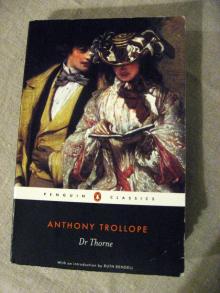 Doctor Thorne
Doctor Thorne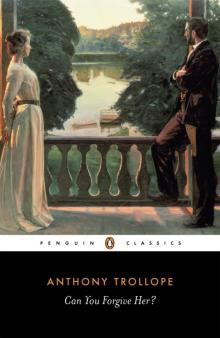 Can You Forgive Her?
Can You Forgive Her?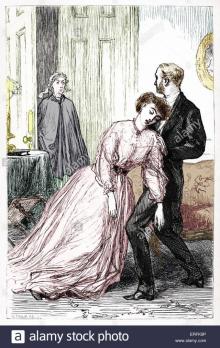 The Last Chronicle of Barset
The Last Chronicle of Barset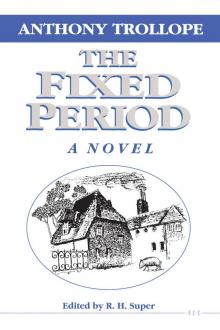 The Fixed Period
The Fixed Period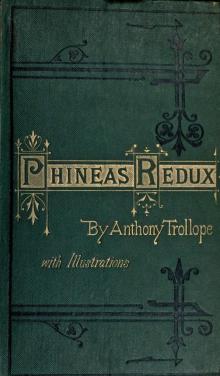 Phineas Redux
Phineas Redux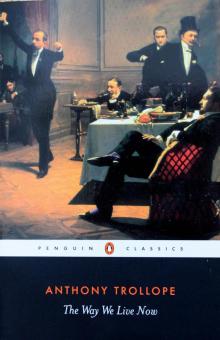 The Way We Live Now
The Way We Live Now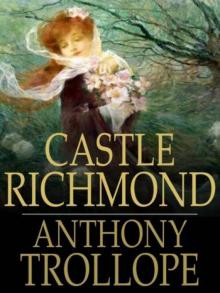 Castle Richmond
Castle Richmond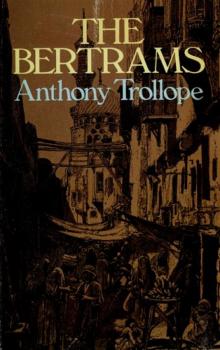 The Bertrams
The Bertrams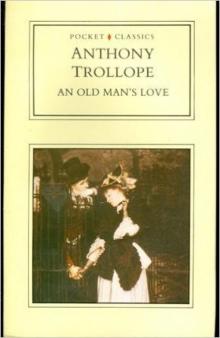 An Old Man's Love
An Old Man's Love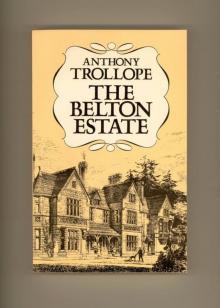 The Belton Estate
The Belton Estate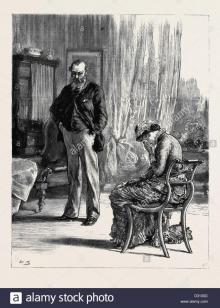 Marion Fay: A Novel
Marion Fay: A Novel The Claverings
The Claverings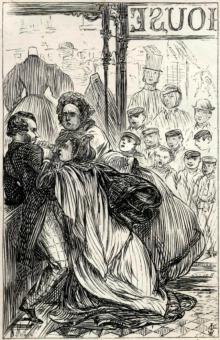 The Struggles of Brown, Jones, and Robinson
The Struggles of Brown, Jones, and Robinson Nina Balatka
Nina Balatka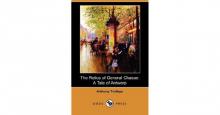 The Relics of General Chasse: A Tale of Antwerp
The Relics of General Chasse: A Tale of Antwerp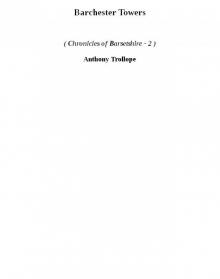 Barchester Towers cob-2
Barchester Towers cob-2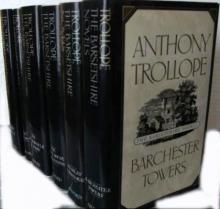 The Chronicles of Barsetshire
The Chronicles of Barsetshire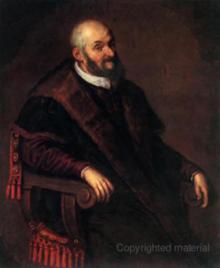 The Warden cob-1
The Warden cob-1 Framley Parsonage
Framley Parsonage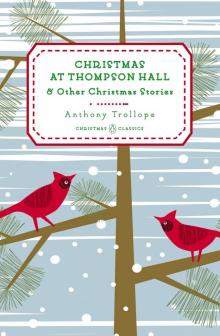 Christmas at Thompson Hall
Christmas at Thompson Hall The Warden
The Warden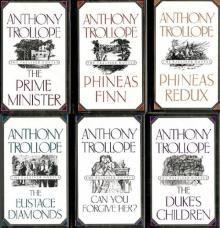 The Palliser Novels
The Palliser Novels The Small House at Allington
The Small House at Allington Barchester Towers
Barchester Towers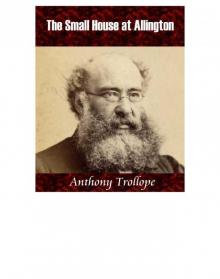 The Small House at Allington cob-5
The Small House at Allington cob-5 The Duke's Children
The Duke's Children Phineas Finn, the Irish Member
Phineas Finn, the Irish Member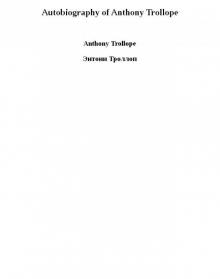 Autobiography of Anthony Trollope
Autobiography of Anthony Trollope